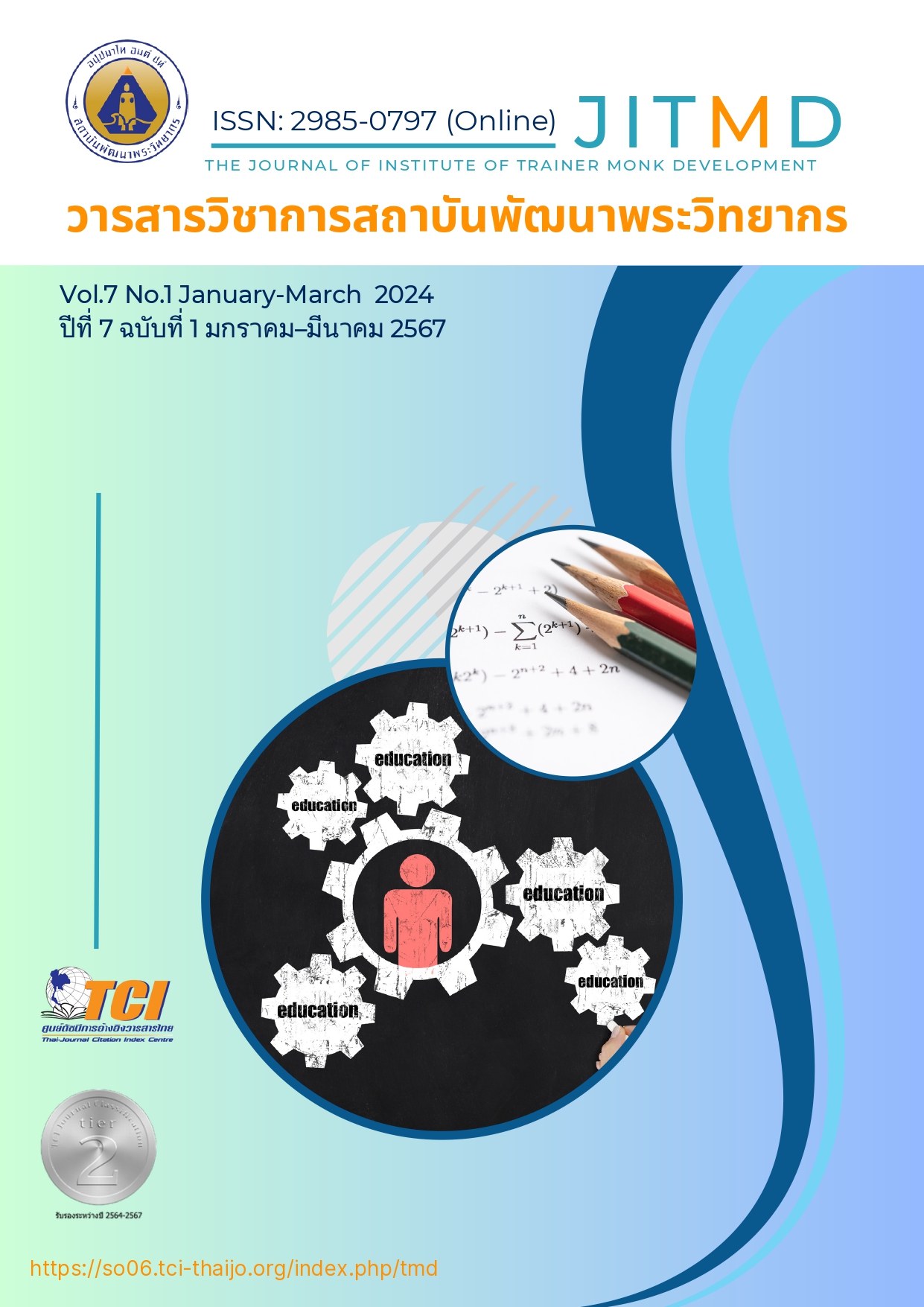การประเมินโครงการศูนย์บ่มเพาะวิสาหกิจเพื่อการศึกษาในสถานศึกษาตามหลักปรัชญาของเศรษฐกิจพอเพียง ในสถานศึกษาอาชีวศึกษาเอกชนแห่งหนึ่ง ในกรุงเทพมหานคร
Main Article Content
บทคัดย่อ
การวิจัยครั้งนี้มีวัตถุประสงค์เพื่อประเมินโครงการศูนย์บ่มเพาะวิสาหกิจเพื่อการศึกษาในสถานศึกษาตามหลักปรัชญาของเศรษฐกิจพอเพียง ประกอบด้วย การประเมินด้านปัจจัยนำเข้าของโครงการ ด้านกระบวนการดำเนินงานของโครงการ และด้านผลผลิตของโครงการ ใช้ประเมินด้วยวิธีการเชิงระบบ (Systems approach) และเป็นการประเมินเมื่อสิ้นสุดโครงการ (Summative Evaluation) ผู้ให้ข้อมูล ได้แก่ ผู้บริหาร จำนวน 5 คน ครู จำนวน 21 คน และนักเรียนที่เข้าร่วมโครงการ จำนวน 20 คน เก็บรวบรวมข้อมูลด้วยการใช้แบบสัมภาษณ์ผู้บริหาร แบบสอบถามครู แบบสอบถามนักเรียน และแบบบันทึกข้อมูล ผลการวิจัยพบว่า 1. การประเมินด้านปัจจัยนำเข้าของโครงการ โดยภาพรวมมีผลการประเมินอยู่ในระดับมากขึ้นไป และผ่านเกณฑ์การประเมินตามเกณฑ์ที่กำหนดทั้ง 4 ตัวบ่งชี้ 2. การประเมินด้านกระบวนการดำเนินงานของโครงการ มีตัวบ่งชี้ทั้งหมด 3 ตัวบ่งชี้ ผ่านเกณฑ์การประเมินตามเกณฑ์ที่กำหนดจำนวน 2 ตัวบ่งชี้ และไม่ผ่านเกณฑ์การประเมินตามที่กำหนดจำนวน 1 ตัวบ่งชี้คือ ความเพียงพอของช่องทางในการประชาสัมพันธ์โครงการ โดยพบว่า ช่องทางการประชาสัมพันธ์ของโครงไม่เพียงพอต่อการแจ้งข่าวสารให้กับครู และนักเรียน 3. การประเมินด้านผลผลิตของโครงการ มีตัวบ่งชี้ทั้งหมด 5 ตัวบ่งชี้ ผ่านเกณฑ์การประเมินตามเกณฑ์ที่กำหนดจำนวน 3 ตัวบ่งชี้ และไม่ผ่านเกณฑ์การประเมินที่กำหนดจำนวน 2 ตัวบ่งชี้ ได้แก่ การมีทักษะการเป็นผู้ประกอบการ 5 ด้าน ประกอบด้วย 1) ด้านเทคนิคการวางแผนธุรกิจ 2) ด้านบริหารจัดการ 3) ด้านการเงิน 4) ด้านการตลาด และ 5) ด้านการสื่อสาร โดยพบว่า นักเรียนที่เข้าร่วมโครงการศูนย์บ่มเพาะฯ ยังมีประสบการณ์ในการดำเนินงานในด้านต่างๆ ไม่มากเท่าที่ควร และความพึงพอใจในการดำเนินโครงการ โดยพบว่า นักเรียนที่เข้าร่วมโครงการศูนย์บ่มเพาะฯ ต้องการให้ทางโครงการสำรวจความต้องการให้สมาชิกในการเลือกกิจกรรม
Article Details

อนุญาตภายใต้เงื่อนไข Creative Commons Attribution-NonCommercial-NoDerivatives 4.0 International License.
บทความที่ได้รับการตีพิมพ์เป็นลิขสิทธิ์ของวารสารวิชาการสถาบันพัฒนาพระวิทยากร
ข้อความที่ปรากฎอยู่ในบทความที่ได้รับการตีพิมพ์ในวารสาร ถือเป็นความรับผิดชอบของผู้เขียนบทความ และข้อคิดเห็นนั้นไม่ถือว่าเป็นทัศนะและความรับผิดชอบของกองบรรณาธิการวารสารวิชาการสถาบันพัฒนาพระวิทยากร
เอกสารอ้างอิง
จักรปรุฬห์ วิชาอัครวิทย์. (2555). รูปแบบการบริหารสถานศึกษาขั้นพื้นฐานตามหลักปรัชญาของเศรษฐกิจพอเพียง. วารสารวิจัยราชภัฏเชียงใหม่, 13(2): 72-87.
นวพัชญ์ ฉีดจันทร์. (2564). “การบริหารงานบุคคลกับแรงจูงใจในการปฏิบัติงานของครูในโรงเรียน สำกัดสำนักงานเขตพื้นที่การศึกษามัธยมศึกษา เขต 8”. วิทยานิพนธ์ศึกษาศาสตรมหาบัณฑิต สาขาวิชาการบริหารการศึกษา. บัณฑิตวิทยาลัย: มหาวิทยาลัยศิลปากร.
บุษกร วัฒนบุตร. (2564). ปัจจัยที่มีอิทธิพลต่อการพัฒนา Soft Skills ของเยาวชนไทยในศตวรรษที่ 21. วารสารวิจยวิชาการ, 4(1): 87-94.
ปรัชญาวรรณ จันทะขาน. (2564). “การพัฒนากลยุทธ์การประชาสัมพันธ์เพื่อส่งเสริมการใช้บริการสารสนเทศของห้องสมุดสถาบันอุดมศึกษาเอกชน”. ปริญญานิพนธ์ศิลปศาสตรมหาบัณฑิต สาขาวิชาสารสนเทศศึกษา. บัณฑิตวิทยาลัย: มหาวิทยาลัยศรีนครินทรวิโรฒ.
พัฒน์นรี อัฐวงศ์ และฐิตารีย์ วงศ์สูง. (2559). ประสิทธิภาพการบริหารจัดการงบประมาณ มหาวิทยาลัยจุฬาลงกรณราชวิทยาลัย วิทยาเขตภาคเหนือ. วารสารสันติศึกษาปริทรรศน์ มจร, 4(1): 73-89.
มนกนก ภาณุสิทธิกร. (2562). “กระบวนการเรียนรู้ของผู้ประกอบการสตาร์ทอัพ”. วิทยานิพนธ์ศึกษาศาสตรมหาบัณฑิต สาขาวิชาวิทยาการเรียนรู้และนวัตกรรมการศึกษา. บัณฑิตวิทยาลัย: มหาวิทยาลัยธรรมศาสตร์.
พระราชบัญญัติ การอาชีวศึกษา พ.ศ. 2551. (2551, 05 มีนาคม). ราชกิจจานุเบกษา. เล่มที่ 125 ตอนที่ 43 ก. หน้า 1-24.
สำนักงานคณะกรรมการพัฒนาการเศรษฐกิจและสังคมแห่งชาติ. (2559). แผนพัฒนาเศรษฐกิจและสังคมแห่งชาติ ฉบับที่สิบสอง พ.ศ. 2560–2564. สืบค้นข้อมูลเมื่อวันที่ 25 สิงหาคม 2563 จาก https://www.nesdc.go.th/ewt_dl_link.php?nid=6422.
สำนักงานเลขาธิการสภาการศึกษา. (2560). แผนการศึกษาแห่งชาติ พ.ศ. 2560–2579. กรุงเทพมหานคร: บริษัท พริกหวานกราฟฟิค จำกัด.
สำนักมาตรฐานการอาชีวศึกษาและวิชาชีพ. (2562). คู่มือการปฏิบัติงานศูนย์บ่มเพาะผู้ประกอบการอาชีวศึกษา (ปรับปรุงเมษายน 2562). สืบค้นข้อมูลเมื่อวันที่ 25 สิงหาคม 2563 จาก https://online.pubhtml5.com/tmes/fpbj/#p=1
Del Pico and Wayne J. (2013). Project Control: Integrating Cost and Schedule in Construction. New Jersey: John Wiley & Sons, Inc.
Mario Vanhoucke. (2013). Project Management with Dynamix Scheduling: Baseline Scheduling, Rish Analysis and Project Control. New Yonk: Springer-Verlag Berlin.


